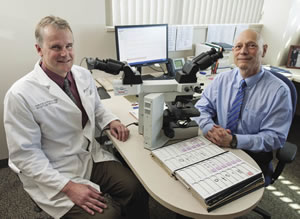Medical Advances at Marshfield Clinic
 Timothy Uphoff, Ph.D., and Bruce Krawisz, M.D.
Timothy Uphoff, Ph.D., and Bruce Krawisz, M.D.
Something revolutionary is happening inside the walls of the Laird Center for Medical Research at Marshfield Clinic. It's nothing less than a new way of treating some of the worst forms of cancer.Precision medicine, as it is aptly called, offers certain cancer patients more effective treatments at lower cost and with fewer side effects. It's a viable option right now at Marshfield Clinic for patients with some cancers of the colon or lung, melanoma or acutemyelogenous leukemia (AML).
These are some of the toughest cancers to treat because they spread rapidly to other areas of the body. Precision medicine recognizes that tumors are often caused by changes known as mutations which occur in a person's DNA, or genetic code.
"A number of other factors, such as environmental influences, can be responsible for cancer developing in a particular person. We are looking for changes in a patient's genetic makeup that can cause cancer so we can treat those causes directly. These treatments are targeted to specific types of mutations in a patient's DNA," said Timothy Uphoff, Ph.D., a molecular geneticist.
His colleague, Molecular Pathologist Bruce Krawisz, M.D., doesn't hesitate to call it revolutionary.
"Pathologists historically have classified tumors based on how they look under a microscope," he said. "Now we can look at what is causing tumor cells to proliferate.
Using genetic sequencing, we are actually identifying the cause of certain tumors."
Armed with that information, a medical oncologist can enter the patient in a clinical trial of a promising chemotherapy drug being evaluated for treating that specific type of cancer.
Once a tumor is removed from a patient, technologists take a biopsy of the tumor and run it through a process to isolate the DNA and read its "sequence," looking for a pattern of mutations known to cause cancer. Computers are vital to this process; the DNA sequence of a human genome is equal to about 200 New York telephone books, each 1,000 pages long. The computer breaks it down to the equivalent of one line in one page of one book.
Dr. Uphoff called Dr. Krawisz a pioneer in this rapidly-growing area. Although Dr. Krawisz has been working on precision medicine for about 10 years, there is little public awareness of it. That's partly because of the nature and pace of medical research; after years of work, scientists are still working to identify the DNA mutations responsible for most types of cancer.
To help support this or other programs, please contact Marshfield Clinic Development at 1-800-858-5220 or visit
www.marshfieldclinic.org/giving.
